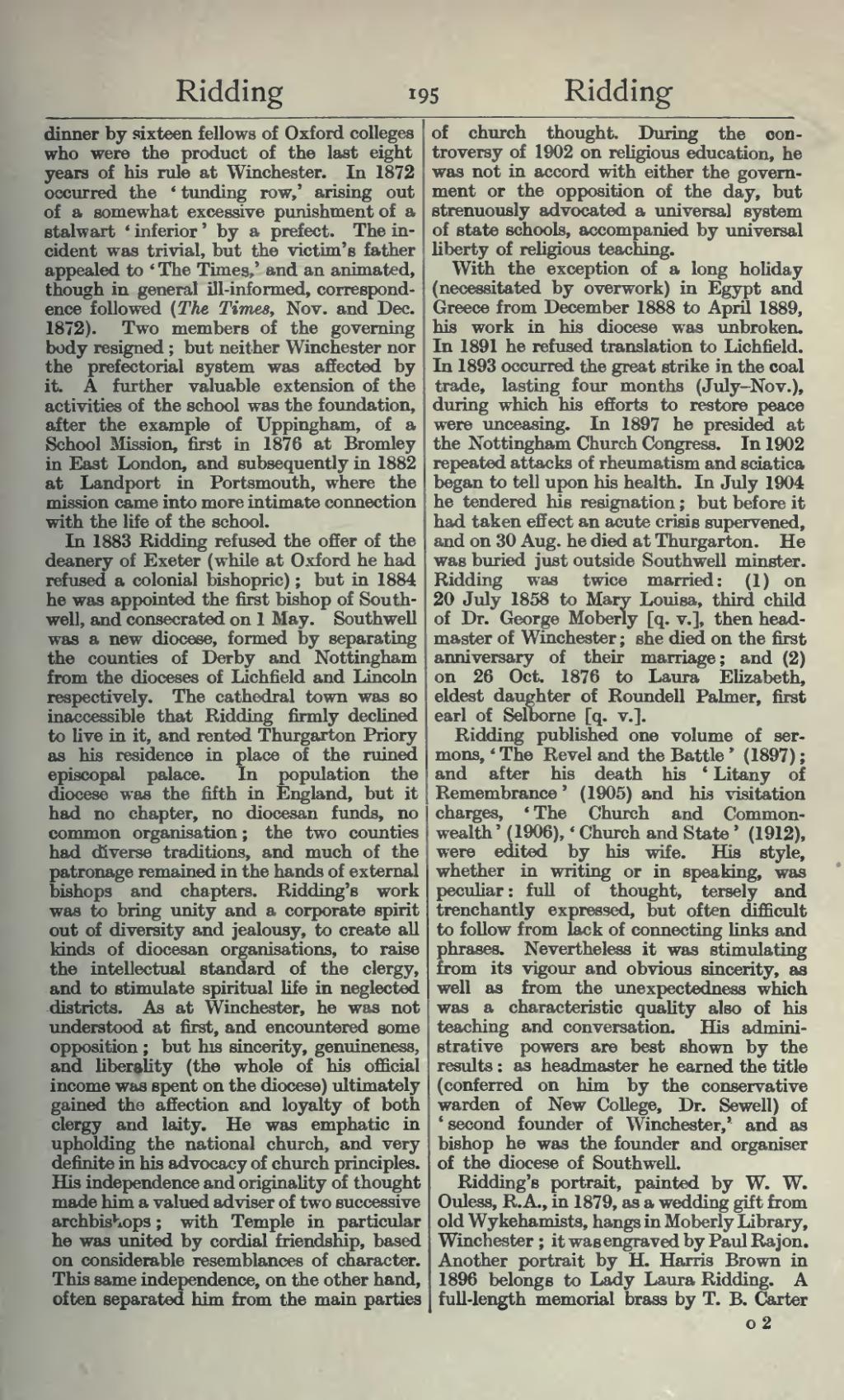dinner by sixteen fellows of Oxford colleges who were the product of the last eight years of his rule at Winchester. In 1872 occurred the 'tunding row,' arising out of a somewhat excessive punishment of a stalwart ’inferior' by a prefect. The incident was trivial, but the victim's father appealed to ’The Times,' and an animated, though in general ill-informed, correspondence followed [The Times, Nov. and Dec. 1872). Two members of the governing body resigned ; but neither Winchester nor the prefectorial system was affected by it. A further valuable extension of the activities of the school was the foundation, after the example of Uppingham, of a School Mission, first in 1876 at Bromley in East London, and subsequently in 1882 at Landport in Portsmouth, where the mission came into more intimate connection with the life of the school.
In 1883 Ridding refused the offer of the deanery of Exeter (while at Oxford he had refused a colonial bishopric) ; but in 1884 he was appointed the first bishop of Southwell, and consecrated on 1 May. Southwell was a new diocese, formed by separating the counties of Derby and Nottingham from the dioceses of Lichfield and Lincoln respectively. The cathedral town was so inaccessible that Ridding firmly declined to live in it, and rented Thurgarton Priory as his residence in place of the ruined episcopal palace. In population the diocese was the fifth in England, but it had no chapter, no diocesan funds, no common organisation ; the two counties had diverse traditions, and much of the patronage remained in the hands of external bishops and chapters. Ridding's work was to bring unity and a corporate spirit out of diversity and jealousy, to create all kinds of diocesan organisations, to raise the intellectual standard of the clergy, and to stimulate spiritual Life in neglected districts. As at Winchester, he was not understood at first, and encountered some opposition ; but his sincerity, genuineness, and liberality (the whole of his official income was spent on the diocese) ultimately gained the affection and loyalty of both clergy and laity. He was emphatic in upholding the national church, and very definite in his advocacy of church principles. His independence and originality of thought made him a valued adviser of two successive archbishops ; with Temple in particular he was united by cordial friendship, based on considerable resemblances of character. This same independence, on the other hand, often separated him from the main parties of church thought. During the controversy of 1902 on religious education, he was not in accord with either the government or the opposition of the day, but strenuously advocated a universal system of state schools, accompanied by universal liberty of religious teaching.
With the exception of a long holiday (necessitated by overwork) in Egypt and Greece from December 1888 to April 1889, his work in his diocese was unbroken. In 1891 he refused translation to Lichfield. In 1893 occurred the great strike in the coal trade, lasting four months (July-Nov.), during which his efforts to restore peace were unceasing. In 1897 he presided at the Nottingham Church Congress. In 1902 repeated attacks of rheumatism and sciatica began to tell upon his health. In July 1904 he tendered his resignation ; but before it had taken effect an acute crisis supervened, and on 30 Aug. he died at Thurgarton. He was buried just outside Southwell minster. Ridding was twice married: (1) on 20 July 1858 to Mary Louisa, third child of Dr. George Moberly [q. v.], then headmaster of Winchester ; she died on the first anniversary of their marriage ; and (2) on 26 Oct. 1876 to Laura Ehzabeth, eldest daughter of Roundell Palmer, first earl of Selborne [q. v.].
Ridding published one volume of sermons, 'The Revel and the Battle' (1897); and after his death his 'Litany of Remembrance' (1905) and his visitation charges, 'The Church and Common- wealth ' (1906), 'Church and State' (1912), were edited by his wife. His style, whether in writing or in speaking, was peculiar : full of thought, tersely and trenchantly expressed, but often difficult to follow from lack of connecting links and phrases. Nevertheless it was stimulating from its vigour and obvious sincerity, as well as from the unexpectedness which was a characteristic quality also of his teaching and conversation. His administrative powers are best shown by the results : as headmaster he earned the title (conferred on him by the conservative warden of New College, Dr. Sewell) of 'second founder of Winchester,' and as bishop he was the founder and organiser of the diocese of Southwell.
Ridding's portrait, painted by W. W. Ouless, R.A., in 1879, as a wedding gift from old Wykehamists, hangs in Moberly Library, Winchester ; it was engraved by Paul Rajon. Another portrait by H. Harris Brown in 1896 belongs to Lady Laiu-a Ridding. A full-length memorial brass by T. B. Carter
